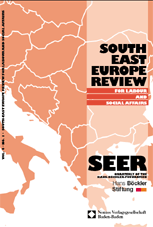Strikes in transition – an attempt at defining new theoretical controversies
Strikes in transition – an attempt at defining new theoretical controversies
Author(s): Darko MarinkovićSubject(s): Politics / Political Sciences
Published by: Nomos Verlag
Keywords: controversies about transition; strikes in transition; trade unions and transition;
Summary/Abstract: The title of this article – strikes in transition – may either confuse readers or otherwise make them wonder what are its aims. The title was indeed chosen with such an intention – not to confuse, but to cause a reaction, i.e. to encourage a different approach to the theory and practice of strikes. In this context, the author has the following points in view. ‘Transition’ originally denoted the process of the transformation of singleparty systems and centrally-planned economies into open societies with market economies and multi-party parliamentary democracies. However, over time it has developed a much wider connotation, both in the semantic and the theoretical sense, as well as becoming a real, extremely complex and wide-ranging social process. Almost all phenomena and processes in such societies are assigned to the notion of ‘transition’. In doing so, transition is treated under its general definition, without the necessary analysis and explanation of certain phenomena and relationships. In other words, ‘transition’, as well as many of the other phenomena and relationships within its scope, are considered as determined by fate, as a major force that cannot in any way be avoided. Such phenomena and relationships include industrial conflict in general, and hence strikes, as one of their most radical forms.
Journal: SEER - South-East Europe Review for Labour and Social Affairs
- Issue Year: 2001
- Issue No: 01
- Page Range: 9-20
- Page Count: 12
- Language: English

